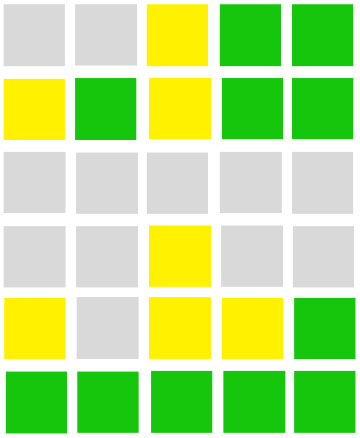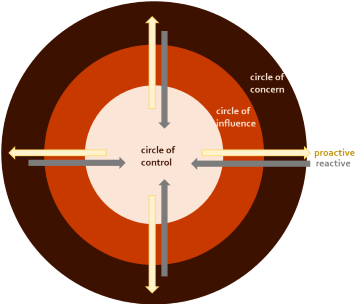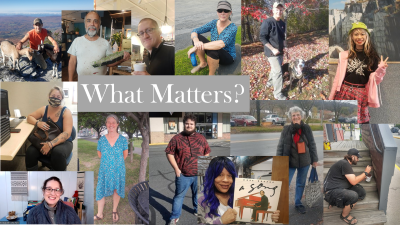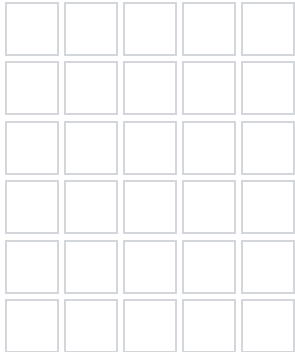
I’ve played Wordle for one week. It’s perfect!
A few short sentences explain the entire game. There is one right answer. Making up words doesn’t help; only reliable information moves you forward.
The puzzle is gentle. Correct guesses are highlighted in cheery bright colors, incorrect guesses in nonthreatening dull hues. There is no alert sound. You can play once a day.
This sweet challenge is a soothing antidote to the constantly shifting, unclear but demanding, consuming, and seemingly high-stakes scenarios swirling around our lives.
Who alive in 2022 is not ready for clarity, direction, and a path to a solution? And where other than Wordle do we find that?
As with the game, the answer must be uncovered. And, there are strategies for getting there.
It’s All Too Much
Our brains are overloaded every day in multiple ways. Constant sorting leads to decision fatigue, conflicting ideas give us cognitive dissonance, and the electronic world’s clamoring for attention creates a sense of urgency. We aren’t made to sip from this fire hose; many neuroscientists currently speak to that. One is Daniel Levitan.
In this article, Levitan explains the toll of multitasking, and the resulting neural addiction. He also explores the expanding expectation that we respond immediately to e-demands; something made even worse with increased working from home. The article doesn’t present solutions, but there are ways to create boundaries around availability, meeting attendance, and when and how you will send correspondence.
This post on verywellmind breaks down the affect watching the new has on our brains and offers some practices to counteract the consequences of overindulgence.
Chunking It Down
Of course we get caught up in the noise. How might we change our experience?
1. Take a Breath
There are some serious, even catastrophic events unfolding. There is a feeling of immediacy, but it’s misleading. Each of us is just one of almost eight billion people living a tiny portion of a seven-million-year journey in the timeline of being human.
Zoom out. Taking a longer view allows you to consider what you really can do, what is important to do, and how to go about it.

2. Draw the Line. Better Yet, a Circle
Stephen R. Covey’s The 7 Habits of Highly Effective People made popular a model he called the “Circle of Concern.” The outer ring holds all that we are concerned about. Closer to the center are situations where we can exert influence. And in the very center of the circle? Things we can control.
Here’s a reliable repeated finding: The one thing we have the most control over is ourselves. Self-care comes into play here; it can make us more effective, healthier, and happier. Here are some wellness basics, as well as some individual approaches to the concept.
As we move outward from this center, we step into our ability to influence. Here are some good ways to increase that.
3. Name That Which Matters
What really is important to you? Is it family? Connection? Love of country? Community? Joy?
One participant in my “What Matters” project talked about her concern for the climate crisis. Her solution, in a space she calls her “little corner of the world,” is to foster connection and creativity. She believes that feeling connected to others flows into connection to what is around us, that we are a part of the natural world, not separate. She asserts that our life—and the earth’s—depends on these understandings. These values guide her actions.

Another man said money matters to him. In his brain, there’s a straight line: His job means money and money means being able to take care of his four beloved daughters. More than one person in the series is starting a business. Their days are largely shaped by pursuing on their own terms the work they feel drawn to.
4. Play Your Part
You occupy a small space that only you can fill. But don’t underestimate the impact you can have. Each of us is part of a whole.
Dharma teacher and author Larry Ward once said, “I am a drop in the ocean; but I’m also the ocean. I’m a drop in America, but I’m also America. Every pain, every confusion, every good and every bad and every ugly of America is in me. And as I’m able to transform myself and heal myself and take care of myself, I’m very conscious that I’m healing and transforming and taking care of America … this is also true globally.”

The world needs one of you in exactly the form you were made. The game awaits.
NOTE: I learned Wordle was purchased by The New York Times minutes before publishing this post. Ever-shifting!
Susan McDowell is a life coach based in Central Vermont.
Check out the Exploration package if the ideas in this post speak to you.